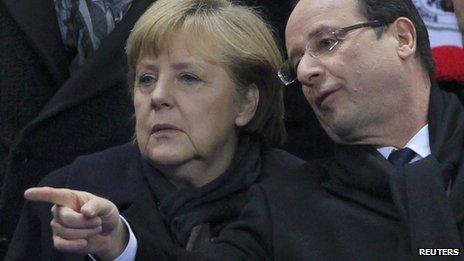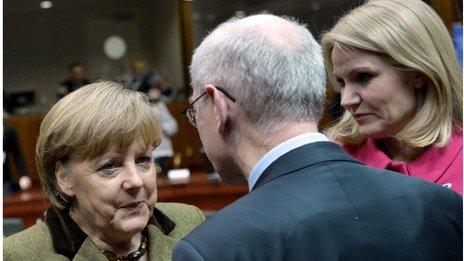EU budget: National interests trump solidarity
- Published
- comments

French President Francois Hollande has been unable to convince German leader Angela Merkel that his direction was the one to follow
Europe - after marathon hours of negotiating - has agreed a long-term budget.
For the first time in the EU's history there will be a real-terms cut , externalin the budget. The total of 960bn euros (£812bn; $1.3tn) represents a 3% reduction from the previous seven-year deal.
This will be claimed as a significant victory by UK Prime Minister David Cameron, whose demand was "at worst a freeze, at best a cut".
The deal, however, has exposed some uncomfortable truths.
There is clearly a significant divide between northern European countries and those of the south and those in eastern Europe. The leaders of Britain, Sweden, the Netherlands, Denmark and to an extent Germany were mindful of their taxpayers in a time of austerity.
Value for money trumped the glue of solidarity.
The southern bloc - and eastern Europe - still look to the EU funds to boost jobs and growth.
This summit demonstrated once again that national politics still dominates. Countries went into negotiations fighting for national interests. The European interest took second place.
Compromise, not reform
The agreement also saw German Chancellor Angela Merkel siding with David Cameron and not Francois Hollande of France.
The key relationship that underpins the EU is usually the Franco-German alliance.
On this occasion the Germans stood with the British and other northern European countries.
It leaves Francois Hollande appearing as if he is the leader of the southern "Club-Med" bloc.
The French president tried to define this battle as less about efficiency and more about promoting growth - but even with strong support from the Italians, he did not not get his way.
The French were prepared to compromise because back in November they had won the crucial argument to leave farm subsidies largely untouched.
So Europe's leaders have agreed numbers. They have been far less successful in reforming and modernising the EU budget.
Take the Common Agricultural Policy and rural development. The funding, at 373bn euros, is lower than during the previous seven-year budget but - at around 37% - it remains the largest item in the budget, although due to fall further in the years ahead.
Less controversially, funding for Cohesion funds - money used to help newer EU members bridge the wealth gap - have emerged largely unscathed. These funds will account for 36% of the budget.
There are new funds for youth unemployment and growth projects, but the signal from the budget is that change comes slowly, incrementally in the EU.
One area that has been sacrificed is spending on cross-border energy, transport and digital networks. Funding has been cut by a quarter and has sparked strong criticism.
Administrative costs which make up 6% of the budget have gone up since the last budget, although they have come down by 1 billion since the figures proposed in November. Some had expected a stronger assault on perks and privileges.
The consensus, then, is that this is a compromise, not a reforming budget.
It is worth noting that what the heads of government agreed is not the final chapter in this story.
The European Parliament has to give its consent. Many MEPs are very unhappy. Hans Swoboda, the socialist leader, said "the agreement of the European Parliament for the figures discussed is not imaginable".
Others are talking of MEPs voting in a secret ballot to avoid them being influenced by their national governments.
Fixing European budgets remains a messy, bare-knuckled fight, but Herman Van Rompuy, the President of the European Council, will argue that he delivered a deal.
.gif)
- Published8 February 2013

- Published24 September 2015